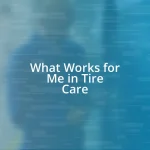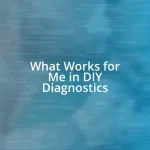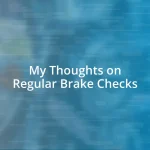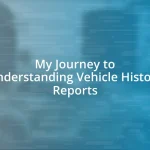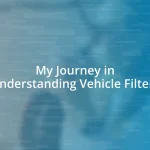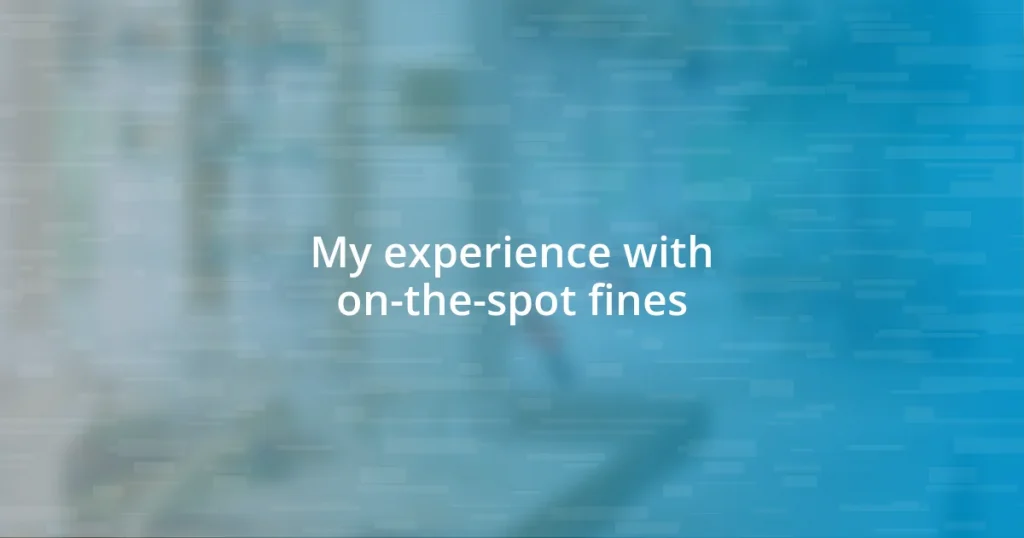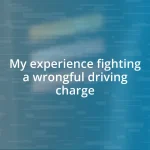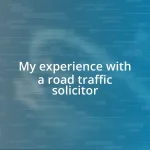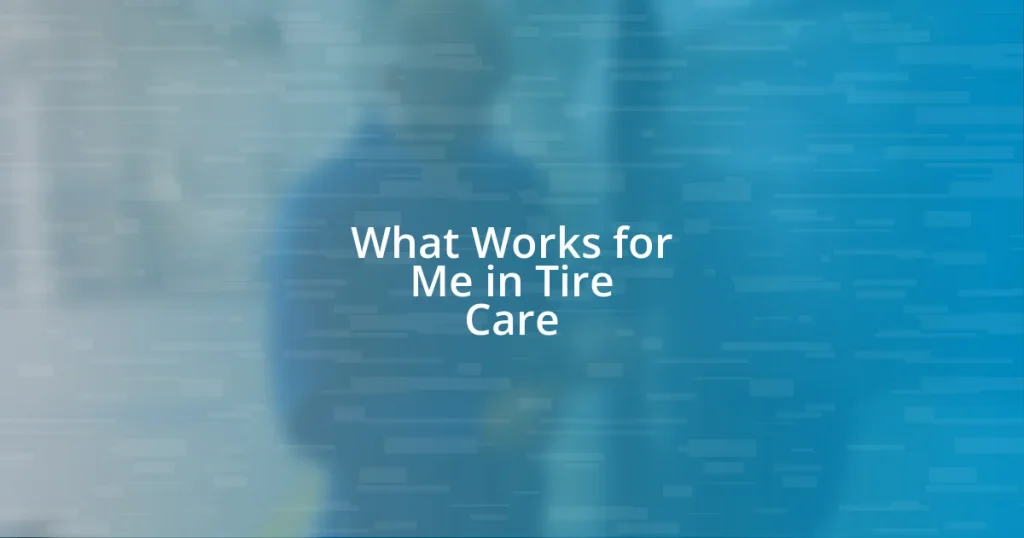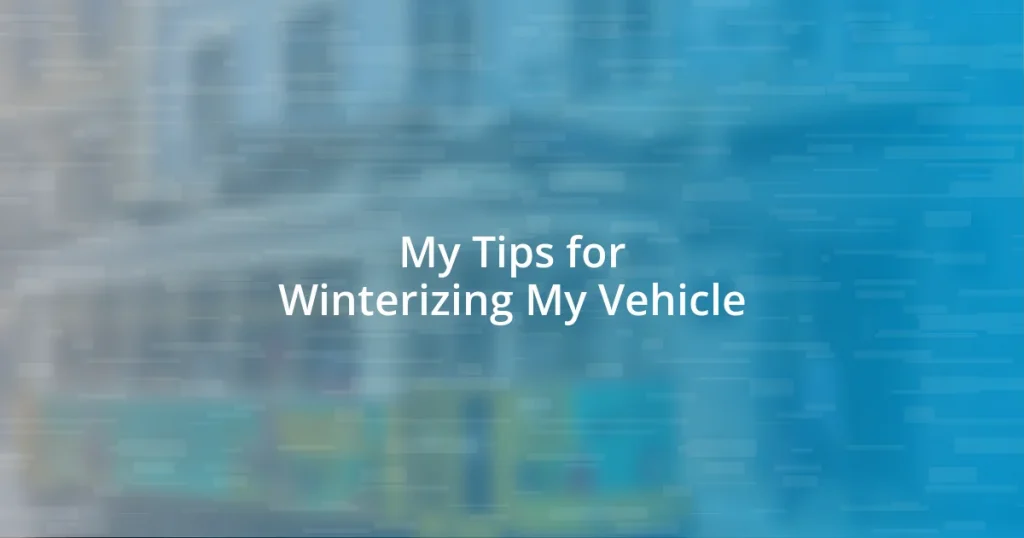Key takeaways:
- On-the-spot fines encourage immediate compliance with laws and serve as a reminder of community responsibility, but can induce stress and financial strain on individuals.
- Common reasons for receiving fines include parking violations, traffic offenses, littering, public disturbances, and non-compliance with local ordinances.
- Proactive measures, such as setting reminders and familiarizing oneself with local laws, can effectively prevent future fines while learning to appeal fines requires careful review and timely submission of evidence.
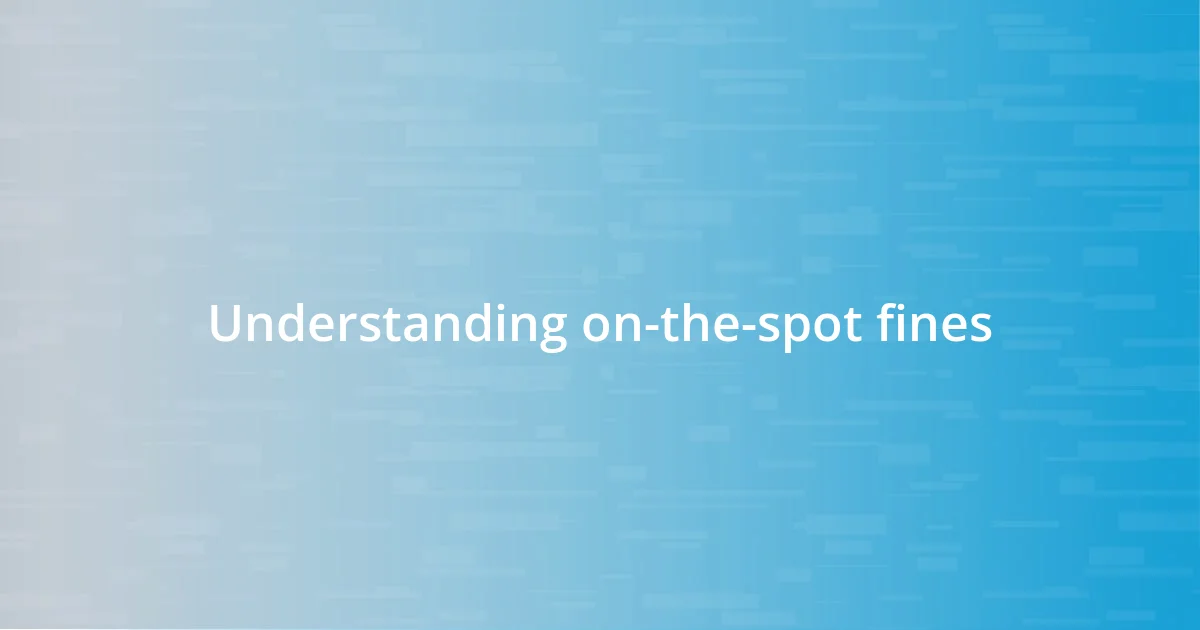
Understanding on-the-spot fines
On-the-spot fines, also known as instant fines or penalty notices, serve as immediate consequences for minor infractions like parking violations or littering. I remember the sinking feeling in my stomach when I found a ticket on my windshield after a quick trip to the store—I had only stepped away for a minute! It’s interesting to realize how quickly a casual errand can turn into a costly mistake.
These fines are designed to encourage compliance with laws in real time, rather than waiting for a court appearance. Have you ever thought about the efficiency this brings to the system? I often wonder if it truly deters repeat offenders or just adds stress to those already juggling tight budgets.
From my experience, the presence of on-the-spot fines creates a sense of urgency about following rules. It forces you to be more mindful, which can feel restrictive at times. However, I’ve also found it helps promote a sense of community responsibility—after all, we all play a part in keeping our surroundings pleasant.
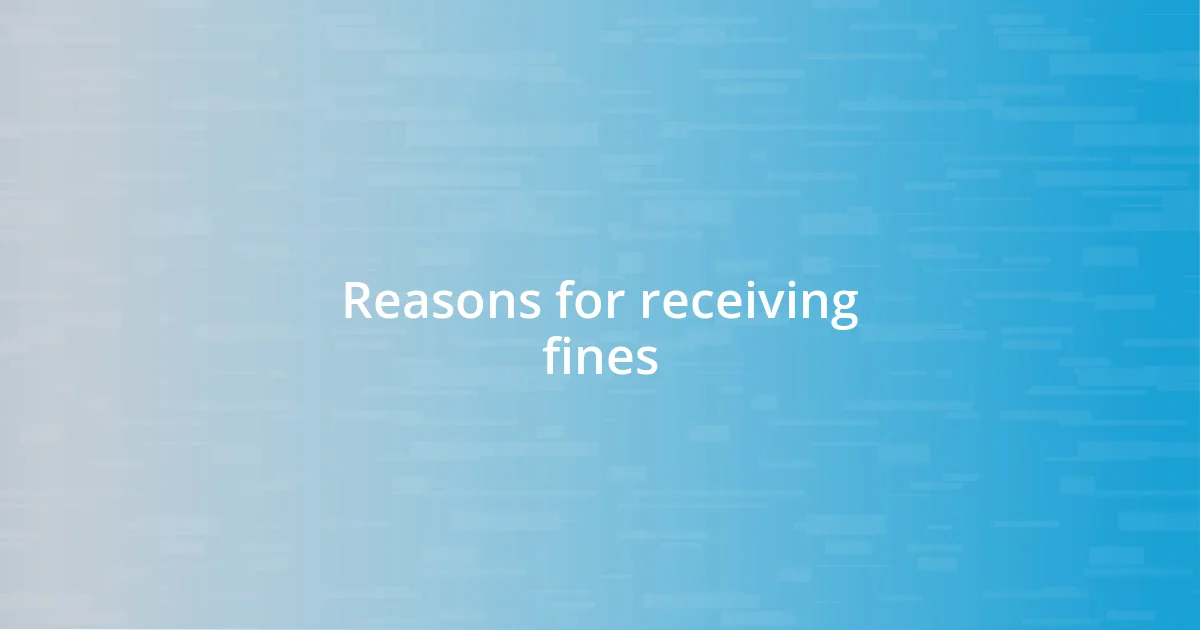
Reasons for receiving fines
Understanding why we receive on-the-spot fines can often feel like navigating a maze of rules and unexpected pitfalls. It’s easy to overlook minor infractions during our busy lives, but I’ve learned that even simple mistakes can lead to hefty penalties. Just last week, I parked in a spot that seemed innocuous but turned out to be reserved. The fine was a sharp reminder of how closely we should adhere to parking regulations.
Here are some common reasons people receive on-the-spot fines:
- Parking Violations: Parking in a no-parking zone, exceeding time limits, or parking in a disabled space without a permit.
- Traffic Offenses: Running a red light or speeding can lead to immediate fines.
- Littering: Disposing of waste in unauthorized areas can result in fines aimed at encouraging cleanliness.
- Public Disturbances: Noise violations from activities like parties or loud music.
- Non-compliance with Local Ordinances: Failure to follow specific municipal regulations, such as pet leash laws or street vendor permits.
Reflecting on my own experiences, I can’t help but feel a mix of frustration and accountability every time I see a fine. It’s a wake-up call, reminding me that while I may be busy juggling life, others are paying attention to the rules we sometimes take for granted.
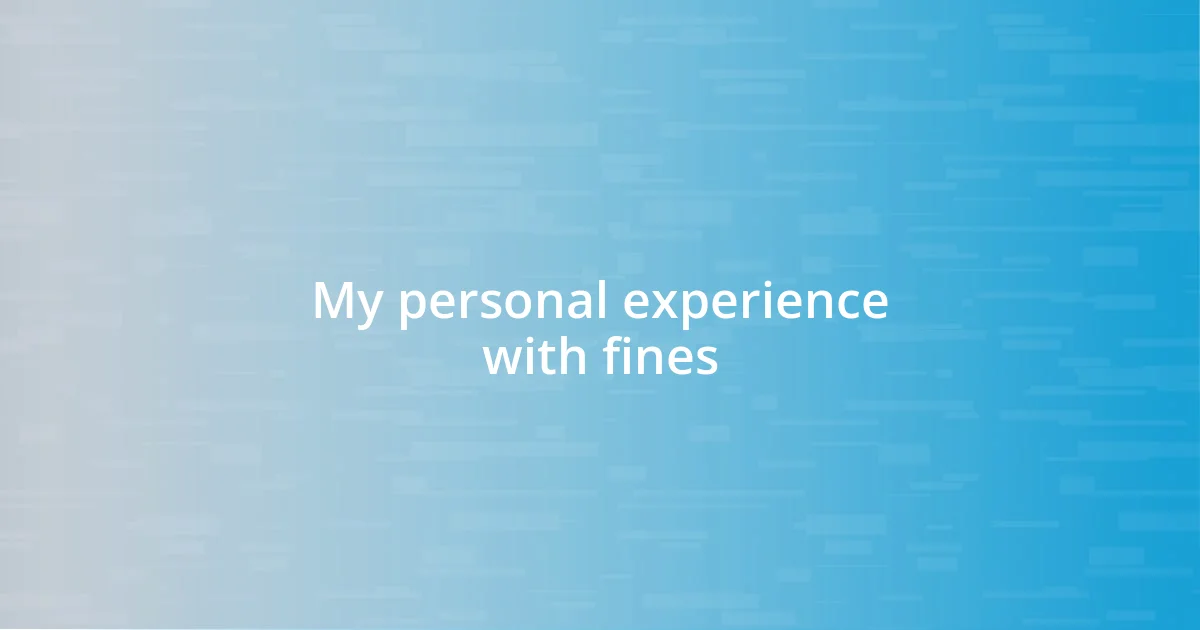
My personal experience with fines
My personal encounters with on-the-spot fines have been eye-opening. I recall a time when I was excitedly rushing to meet friends, only to discover a ticket waiting for me on my windshield. That moment was a mix of disbelief and annoyance; I had parked in what I thought was a legitimate space. It hit me then that even the smallest oversight can become a costly lesson.
Another experience sticks with me—getting fined for littering during a picnic. In my haste to pack up and leave, I inadvertently dropped a wrapper on the ground. I was devastated when an officer approached me, issuing a fine. It felt utterly embarrassing and made me reflect on how easily our actions impact the environment and community. That moment reinforced my belief in being more mindful of my surroundings.
In comparing my fines to those of my friends, I noticed a pattern: while some were quick to dismiss their penalties as “just a cost of living,” I saw each fine as a reminder of my responsibilities. I often think about how different experiences shape our views on compliance and accountability. It’s fascinating, really, to see how fines can provoke varied emotional responses depending on our circumstances and personal values.
| My Experience | Friend’s Experience |
|---|---|
| Felt disbelief and annoyance upon receiving a ticket for a parking violation. | Dismissed the fine as “just part of life” after parking in a reserved area. |
| Devastated after being fined for littering, which sparked a personal reflection on community responsibility. | Saw littering fines as a nuisance, without second thoughts on environmental impact. |
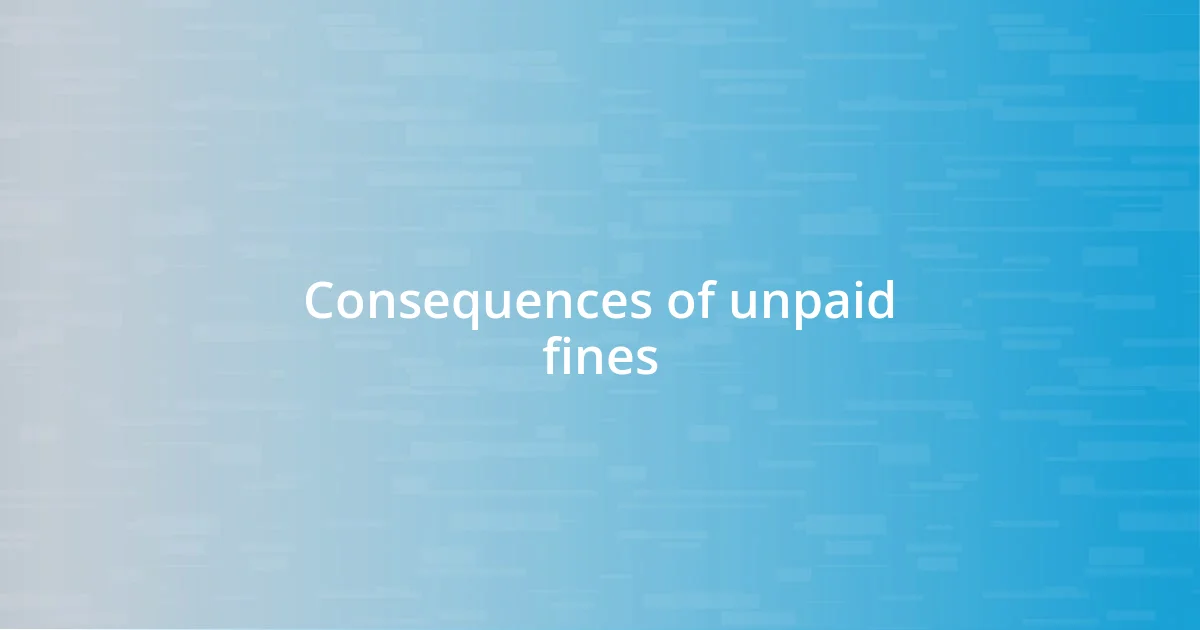
Consequences of unpaid fines
Unpaid fines can snowball quickly and lead to much more than just a dent in your wallet. I vividly remember a friend who thought ignoring a parking ticket was a good idea. A few months later, he received a notice about escalating fees and even court summons. It was incredible to see how one overlooked fine transformed into a serious legal matter—a real eye-opener for us all.
The stress of unpaid fines often has ripple effects that go beyond just financial implications. I found myself feeling anxious every time I thought about my own pending tickets. It’s funny how that nagging worry can affect your daily life; every knock on the door or unexpected letter became a moment of dread. Have you ever experienced that? It’s a feeling of vulnerability, realizing how something seemingly minor can take on a life of its own.
Reflecting on my experiences, I’ve come to realize that ignoring fines also impacts one’s credit score. In my case, the anxiety of being pursued for unpaid fees affected my financial plans. I had to shift my budget around to accommodate fines that could have easily been paid off if addressed promptly. This realization made me question: how many people choose to ignore such fines only to complicate their financial futures? I truly believe it’s worth taking a moment to address these issues before they escalate.
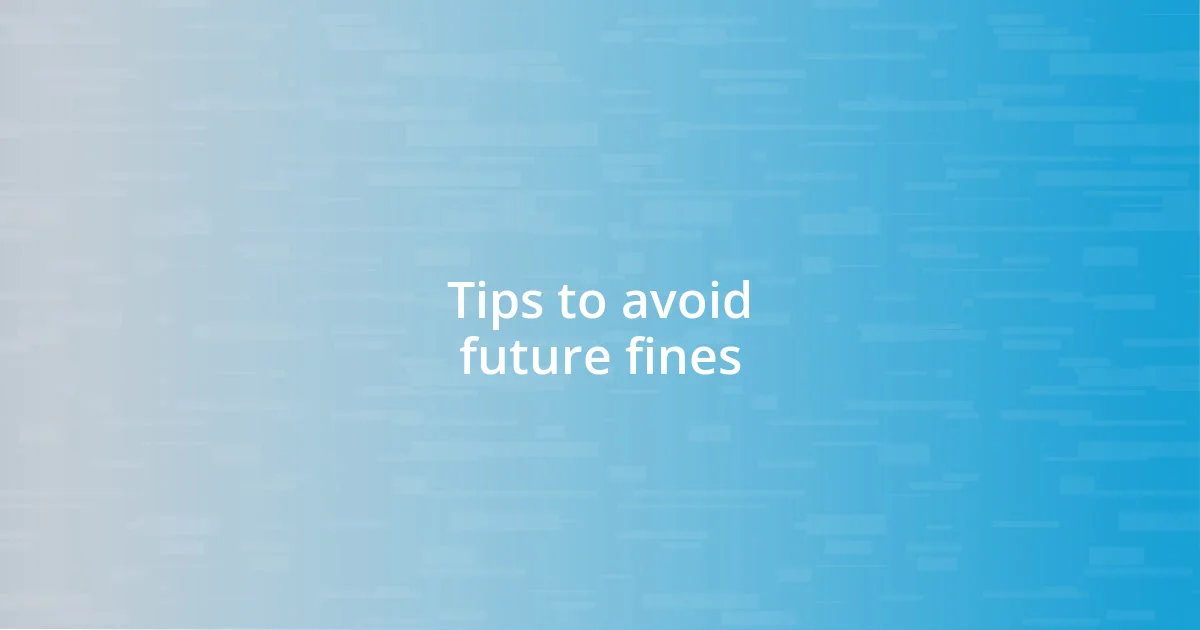
Tips to avoid future fines
To avoid future fines, I’ve found that being proactive can make a significant difference. For instance, I’ve started setting reminders on my phone for parking expiration times. It seems simple, but those alerts have saved me from several potential fines. Have you ever thought about how easy it is to forget something small, only to face an unexpected cost later?
Another tip is to familiarize yourself with local laws. When I moved to a new neighborhood, I made it a point to read up on any specific regulations—like street sweeping days and no-parking zones. Trust me, this investment in time paid off. It’s remarkable how knowledge can prevent minor mistakes from turning into costly fines.
Finally, I’ve learned to be more mindful of my surroundings, especially when it comes to littering. After my embarrassing incident in the park, I carry a small trash bag with me on outings. It’s a small adjustment, but it helps me take responsibility for my environmental impact. Have you ever felt like a simple effort on your part could create a ripple effect for better community behavior? It really does make a difference!
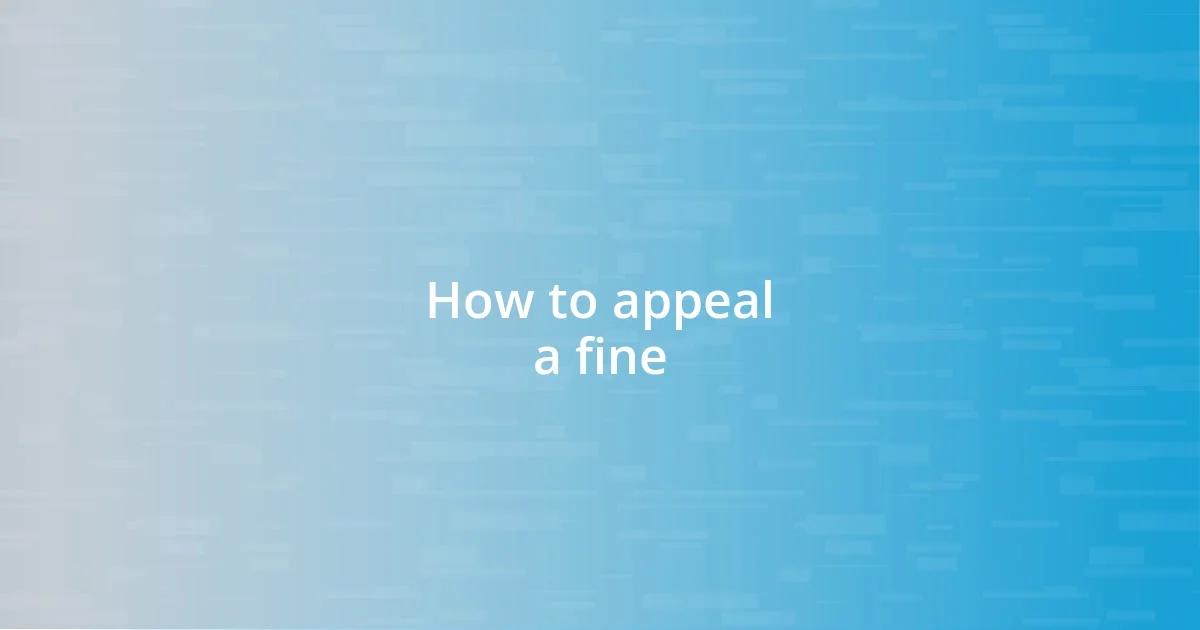
How to appeal a fine
If you find yourself needing to appeal a fine, the first step is to carefully review the ticket. I remember receiving a speeding ticket that seemed unjust at the time. By checking the details, I noticed an error in the recorded speed, which gave me a solid basis for my appeal. Have you ever found discrepancies that turned the tables in your favor?
Once you have gathered your information, be prepared to submit a concise appeal letter. I often included clear evidence like photographs or maps to support my claims; it enhances credibility. I can’t stress enough how persuasive it can be when you back up your argument with facts. What’s more convincing than having everything laid out so the authorities can see your side?
Lastly, timing is crucial. Make sure to submit your appeal within the designated period specified on the ticket. I once missed a deadline by just a few days, which was devastating. It felt like a lost opportunity to voice my concerns. So, keep track of those timelines. Have you ever thought about how often we overlook important dates in our busy lives? It’s a small yet powerful detail that can significantly impact your appeal process.

Lessons learned from my experience
Reflecting on my journey with on-the-spot fines, I learned the hard way that haste can lead to costly mistakes. There was a moment when I parked my car hastily, convinced I’d only be a minute. Imagine my surprise when I returned to find a fine on my windshield! It was a stark reminder that taking my time, even for a brief errand, can save me dollars and disappointment.
I’ve also realized the importance of a calm mindset when dealing with fines. I vividly remember feeling overwhelmed after receiving a ticket. Instead of reacting impulsively, I took a step back to analyze the situation. This approach not only helped me cope emotionally but also equipped me with the clarity needed to evaluate my options. Have you ever noticed how our initial reactions can cloud our judgment? Taking a breath can actually lay the foundation for better decision-making.
Lastly, I’ve come to appreciate the value of community experiences in navigating this landscape. I once joined a local forum where people shared their own fine-related tales—everything from insights on contesting tickets to clever tricks for avoiding them altogether. It felt empowering and connected. Have you ever thought about how shared experiences can teach us important lessons? Understanding that I wasn’t alone in facing these issues gave me a renewed sense of confidence.

